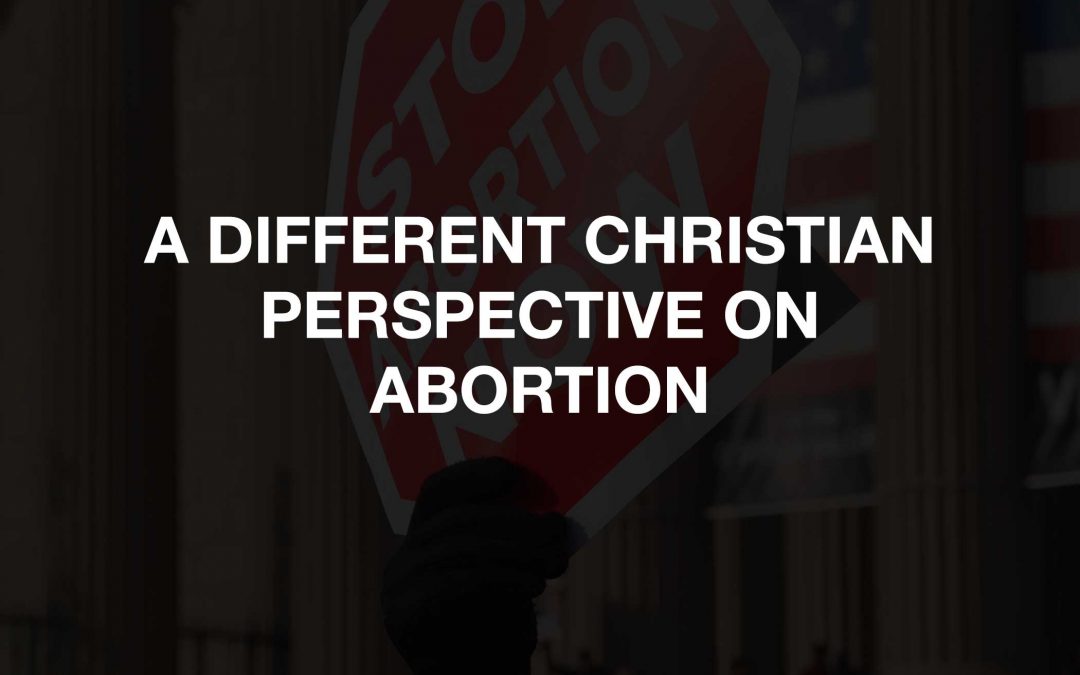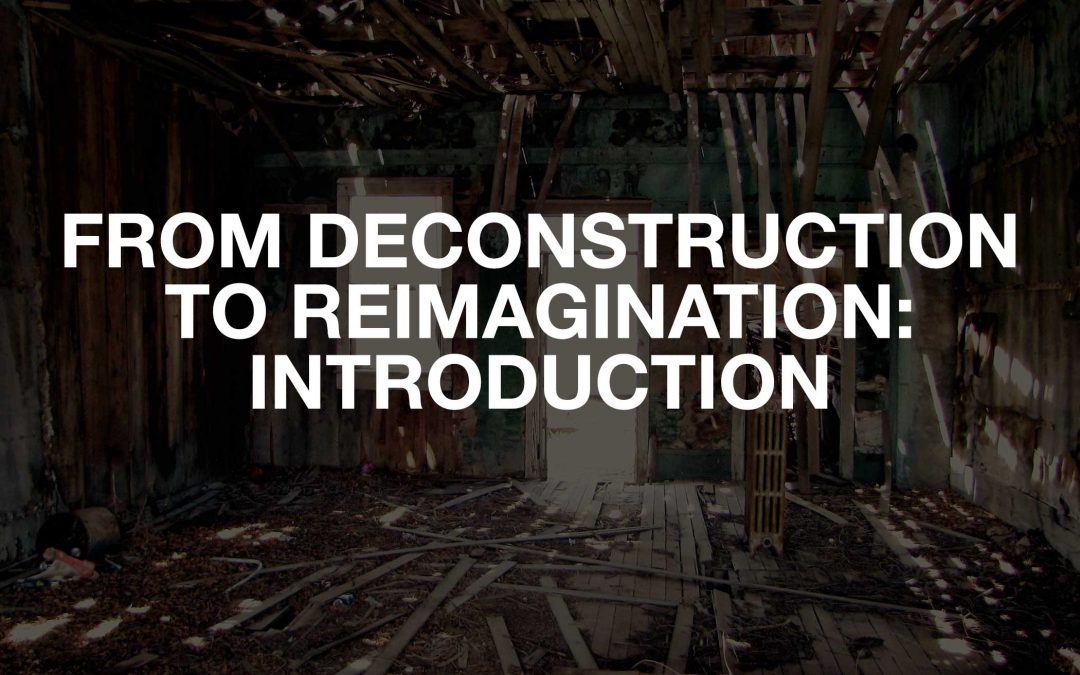The End Times: From Deconstruction To Reimagination

THE END TIMES (ESCHATOLOGY): FROM DECONSTRUCTION TO REIMAGINATION
When I was a kid my parents bought a new recliner. I remember being in the car with my mom, who I believe had just put it on a credit card or some sort of payment plan. When I asked how long it would take to pay off she replied, “Well, Jesus will probably come back before it’s paid off anyway!” She was joking, but unfortunately, that type of end times belief created the idea that, “I probably won’t be around when that happens anyway. And since God is going to rapture me away before the tribulation and make all things new, why should I care about what happens to this world?”
So what in the world is eschatology and why should we care about it? Because let’s be honest, after a global pandemic, major political upheaval and unrest, and facing the brink of World War 3, we’re all just trying to survive the next hour, let alone think deeply about the end of the world!
Before we go any further, I think it’s important to address what the End Times (Eschatology) are and why it’s important. Eschatology is the study of “last things.” This is usually in view of the end of the world or end times. The Oxford English Dictionary defines it as, “the part of theology concerned with death, judgment, and the final destiny of the soul and of humankind.” Eschatology is extremely important to the Jesus-follower because it informs how we will live out our daily calling of bringing Heaven to earth. It informs the immediacy in which we live and think about evangelism and discipleship. If we believe that Jesus could return at any moment, just as the Apostles did, it affects the importance of our ministry and daily actions. If we believe there is a resurrection of the dead, as Jesus did, it affects how we comfort and grieve people in loss. If we believe we will all be judged, it affects how we love God and love others. If we believe our Father is in the business of reconciliation and renewal, then we should be about our Father’s business. Eschatology has the opportunity to breathe wisdom into how we live out our daily lives in the present – therefore, it’s important that we have a healthy biblical belief on the “end times.”
My Deconstruction Continues
As my deconstruction journey continued developing throughout the last year of my undergraduate degree, my eschatology also followed suit. Eschatology has always been a passion of mine since I was a kid. I love(d) reading Revelation, studying Jesus’ future prophecies, and the Left Behind series. I’m not going to dive too deep here into my thoughts on eschatology, but I do want to explain what the deconstruction of eschatology was like for me, how eschatology and political identity are scarily similar when it comes to evangelical theology, and where we need to go to reimagine a healthy eschatology.
PANIC! CHAOS! HORROR!
I’ll never forget the terror I experienced while watching Kirk Cameron’s Left Behind movie in the 90s. Much like “Heaven’s Gates, Hell’s Flames” this cinematic horror was designed to scare people into following Jesus. The thought of our (poorly acted) loved ones magically disappearing while the rest of us are stuck in a dystopian nightmare and forced to get the (ambiguous) mark of the beast was terrifying as a 12-year-old. I’m sure I was one of many who used to pray, “Jesus, please don’t come back until [this or that] happens.” And while that’s hysterically sad, what’s truthfully sad is the escapism that such a false eschatology has created.
I don’t want to bore you with all the details of this version of eschatology and the end times, so if you want to read a little extra on when this idea was formed and some additional info, see this footnote below.*
Thy Kingdom Come!
Don’t get me wrong here. The imminence of Jesus should be a core belief among His followers. He could absolutely come back before I even finish writing this article….*eagerly waits*…. *Deep sigh of relief…student debt pops into my mind…okay now I’m disappointed* You get my point. Jesus was clear that we must eagerly expect His return and that our lives and ministries should be fueled by this teaching (Get it? Oil. Fueled. *sighs* I’ve definitely become a dad. See Matthew 25:1-13). However, we have a responsibility to use our time and our resources wisely. We can’t just flippantly say, “Well, I’m going to Heaven one day and let’s be honest, the way this world looks, Jesus will come back before I’m dead anyways!” Both Jesus and John the Baptist were clear that “the Kingdom of God/Heaven is at hand.” Jesus has given us the responsibility to continue His ministry of bringing Heaven to earth – there is no greater calling on our lives. Our eschatology should never cause us to retire to our reclining chairs as if we don’t have a Kingdom-commanded responsibility. The Kingdom of Heaven is not (just) where you go when you die, the Kingdom of Heaven is what we’re commanded to bring to earth every single day – “Thy Kingdom come. Thy will be done. On earth as it is in Heaven.”
Back to my story. Fast forward to my senior year of college. I had just gotten back from my first trip to Israel where I spent 5 weeks in the Holy Land and I finally got to take a class on Revelation with a top scholar on the subject of Revelation and Eschatology. I was blown away by how poorly I had interpreted Revelation for all those years. And this is where eschatology and political identity meet – and where my deconstruction of eschatology logically followed my deconstruction of politics. Brace yourselves. Take a deep breath. 3. 2. 1…
Here We Go
My eschatology and political identity were intertwined because I was raised to believe it was through Israel that the entire Left Behind sequence of events would kick off. Israel would return and be a nation in the Promised Land again and after a certain period of time, Jesus would “come back” (aka rapture the true believers), the anti-Christ would rise in power, there would be a seven year tribulation for all of those who were left, a third temple would be built on the Temple Mount, there would be an abomination of desolation in the Temple, and so on.
Furthermore, there is a belief that exists in the church that America is mentioned in Revelation and it’s America’s ties with Israel that will be present when this all takes place. It has really become an “America is the savior” story for many evangelicals who follow this eschatology. And since it was Republican Conservatism that claimed to be Israel’s friend, it was imperative as a Christian that I believe that Israel can do no wrong. In this ideology, you are raised and trained to believe that the modern day country of Israel is quite literally God’s gift to the world. You are not allowed to criticize the (secular) government of Israel, and if you do then you are evil, heretical, and anti-semitic since it’s the events that happen in and through Israel that will ultimately help usher in the second coming of Jesus.
I’m out of breath just typing all that.
So I went to Israel. I took an in-depth class on Revelation. My political identity had already been in the process of deconstruction, and now, it was as if you could hear this glass break and my eyes were opened. By the end of my senior year of college, I realized I knew very little about the end times because we, collectively, do not really know a lot about the end times. By the end of my senior year, I knew 4 things:
- Jesus will come back.
- There will be a resurrection of the dead.
- There will be a judgment of everyone.
- The end game is God’s reconciliation and renewal.
While Jesus and the Disciples certainly gave us signs to look out for, most (most being the keyword here) of what Jesus predicted has already come to pass within those initial 100 years after He ascended with the Jewish Revolt and the destruction of the Temple.
I am not advocating that there are no such things as “signs of the end times.” There is no doubt in my mind, especially after the last 100 years, that we are certainly getting closer to a return of Jesus. With that being said, I want to help us reimagine our eschatology from a biblical perspective and answer two questions.
- It’s going to happen anyways, so why should I even care?
- How do we live in the tension of, “I have to pay my bills but Jesus could come back tomorrow and people need to hear the Gospel”?
The Beginning Of Wisdom
I’ve been thinking a lot about fear lately and this proverb: “The fear of the LORD is the beginning of wisdom.” Why you may ask, have I been thinking about fear so much? Because my son, Noah, doesn’t have any! Noah is currently 10 months old and he LOVES climbing our stairs, which are quite high. But he has no fear and thus no wisdom for how to climb the stairs without falling backward and hurting himself. If this were the only thing he needed wisdom for!
If Noah does not have a healthy fear of his future consequences he will not have a present wisdom when climbing the stairs. If we do not have a healthy fear of what our future consequences may bring, we will not have a present wisdom when living out our daily lives.
A couple of years ago I had a pretty significant health scare from bad lifestyle choices. It shocked me into getting healthy. I’ll never forget when my doctor told me, “A little fear can go a long way!” Do I want to be around when Noah or any future children learn how to drive? Do I want to be able to teach him how to tie his shoes, change a tire, etc.? The beginning of wisdom is a healthy dose of fear.
When it comes to the “end times” we should have a healthy fear. The truth is that it is scary in that we don’t really know 100% how things will play out. We don’t know when Jesus will come back and He says as much. And while a lot of those eschatological passages from Jesus and the book of Revelation were for those early 1st-2nd century Christians, they were written to encourage people to stand firm in the faith, even in the midst of fear and uncertainty. After 2,000 years of many “antichrists” and many scenarios where it seems like the worst tribulation one could ever experience, John’s words in Revelation echo through eternity the timeless truth: Things will always be difficult as long as we’re on this earth and until Jesus returns; but stand firm, because Jesus is coming and through Jesus, God will make all things new.
Revelation is a call for Jesus-followers to continue being faithful in the midst of trial, hardship, and adversity. It’s a message about world governments that will endlessly be corrupt and follow the way of “the beast.” And in spite of those things, Jesus is still “King of Kings and Lord of Lords.” It is a call to reject corruption, idolatry, immorality, murder, and lies (Revelation 22:12-15). Our eschatology reminds us that there is a price to pay for following the ways of the world and “the beast.” The ones who will remain with Jesus are those who worshiped God and treated their neighbor with love, kindness, and respect (Matthew 25:31-46)
We should have a healthy fear of the end times because we should also have a healthy fear of YHWH. And that fear guides us with wisdom about how to utilize our time, efforts, and resources to bring Heaven to Earth. We know that when Jesus returns, there will be a resurrection of the dead and there will be a final judgment. And we know that ultimately, God will make all things new.
The Mark Of The Beast
I should note here, that when I say a healthy fear, I don’t mean a fear of the ambiguous modern idea of the mark of the beast, 666, or anything like that. Many of those terms have become associated with modern inventions that were foreign to John and any other first century writer. The mark of the beast is a contrast to the “seal on the foreheads of the servants of our God” in Revelation 7:3. John sees the potential for things getting so bad in Rome that a full scale persecution could break out at any moment, even limiting what they could buy or sell, thus leaving Christians to decide if they will worship Caesar or worship Jesus. John essentially says that by worshipping the emperor, they are “marking themselves” as belonging to Satan since Caesar was synonymous with the Beast. One cannot serve Jesus and the Beast/The Emperor.
To further this point, and give you peace when checking out at the register, you are not going to hell if you checkout and the cost is $6.66. This number was likely a reference to Nero. When transliterated from the Greek into Hebrew, using gematria, one gets “Neron Caesar – נרון קסר” which equals 666. What’s interesting here is that the Greek therion (the beast) also comes out to 666 when written in Hebrew. Thus, John attributes the beast with The Emperor, since both are puppets of Satan. As noted in Reddish’s commentary, “Either one belongs to God or one belongs to the beast (and thus to Satan).”** Even though I really want to, I’ll leave comments about Christian Nationalism for another article.
Get On With It Already!
In theology, we have this super scholarly fancy term for Jesus’ inauguration of the Kingdom. Like really, really high-level scholar talk. It’s called the “already/not yet.” Super complicated, right? This term is important for eschatology because it reminds us of the tension we live in. Jesus has already inaugurated the Kingdom through His life, death, resurrection, and ascension. Jesus came and proclaimed Isaiah 61 and has initiated the coming of the Kingdom to earth and it is our job to continue that ministry. But it has not yet been fully consummated. There is still war, famine, corruption, etc. And so this tension is a reminder for us that while we have access to the Kingdom now and we have the opportunity to bring Heaven to Earth now, it is not yet completely realized.
So I Begin With The End In Mind
Well, it’s been almost 2,000 years since Jesus spoke His last words in person among the disciples and provided them with the Olivet Discourse and the Great Commission. It’s been almost 2,000 years since the writings of Peter, Paul, and John. And while Jesus has yet to return, we continue reading their words, participating in the Kingdom, and doing our best to remain obedient to the leading of the Holy Spirit in our lives.
As we reimagine our eschatology, I’d like to “begin” the conclusion with a quote from my all-time favorite song: “So I begin with the end in mind. Cycles of Heaven, twenty centuries gone by, come home.” –Norma Jean, Disconnecktie: The Faithful Vampire
I think legacy is an important word here as we conclude. Our actions have consequences both here in the present and when we will inevitably stand before YHWH. Our actions have consequences for our families, our friends, our kids, and our kids’ kids. Will we stand firm and continue addressing Jesus as LORD and serving Him and our neighbor in the midst of hardship, and trial, and God forbid it, real persecution and tribulation? Will our love for YHWH and our neighbor echo through future history to meet us at our resurrection and judgment?
I am not YHWH, Jesus, or the Holy Spirit. I will not be the final judge and it will not be me who extends eternal or a renewed life to anyone. So I don’t know the final resting place of anyone and I do not know exactly what will happen in the future aside from the broad mentions of the resurrection, judgment, and God making all things new. What I do know is that Jesus and the writers of the New Testament make it very clear that our actions today will affect our stance in the future.
Will your actions today meet you in the future? Will your faithfulness to Jesus follow you as you meet Him face-to-face? Will your love for your neighbor reverberate for generations to come? That, my friends, is why eschatology is important.***
Thank you so much for taking the time to read this. If you have any questions, I would absolutely love to keep the conversation going. You can message me on social media or send me an email [email protected]
מרנאתא/Maranatha
-Justin
*Pre-tribulation refers to the time before “the great tribulation.” Those who hold this view claim that Jesus will rapture the believers before this tribulation takes place, and they use these verses: Matthew 24:21, Mark 13:19, and John in Revelation 3:10. The rapture refers to the church being “caught up.” There are different verses people use to justify this, such as Matthew 24:37-39, Luke 17:26-36, 1 Thessalonians 4:16-18, though none of them portray the “Left Behind” idea of magically disappearing. This idea is famously tied to John Nelson Darby in the 1800s. However, one cannot deny that there were earlier church fathers who believed in some sort of rapture, such as Irenaeus (Against Heresies, Book 5, Chapter 5). Some use Revelation 3:10 as justification of pre-tribulation rapture, but this verse and this pericope was written for the actual church in Philadelphia in the first century CE. While there are timeless truths within this section of Revelation, John’s writing here on behalf of Jesus was for that church at that time. Real tribulation and persecution of Jesus-followers was happening and the letter was written as encouragement to persevere and endure.
**Reddish, Mitchel G.; Smyth and Helwys Commentary on Revelation. p.260-262.
***I know what some of you may be thinking here. “Justin, are you advocating that our good works get us into Heaven?” I am not. Paul is clear in Ephesians 2:8 that we are saved by grace through faith. But as Jesus repeatedly reminded his followers, there was a cost to following Him. It’s true, your good works cannot help you enter the Kingdom. But your good works are a result of the Kingdom entering you. They are the manifestation of the Holy Spirit beginning to work in you and initiating that new life of sanctification (the process of being made holy). If you encounter Jesus and claim to love Him, but never take a step towards following Him and living out the ways in which He commanded us to live, then you aren’t really a disciple, you’re a fan. Think about it this way. When the Israelites were between the sea and the Egyptians, God “delivered” them (Deliver is the same verb for the name of Jesus – Yeshua). It was God who saved them. But if the Israelites never walked through the sea to the other side, they would have died at the hands of the Egyptians or they would have gone back to work as slaves. So it is with our faith. Jesus offers us a new life here and now but we have to actually walk out that faith. We have to take the steps forward, and those steps require us to take action. “Faith without deeds is dead (James 2:14-26).”
Leave A Comment
I’d love to hear your thoughts on this article! Please remember to be kind and respectful. If you didn’t like something, I always welcome constructive criticism. However, any form of hatred, bullying, or racism will not be tolerated.

About The Author
Justin Boothby is a lifelong student who loves to travel, film, write, design websites, and life coach. Most importantly he loves to Pastor in all different kinds of ministry settings. He’s also an avid pizza lover, metalcore listener, and shot glass collector.
Join me in my latest Lectio Divina session.
Recent Blog Posts

A Different Christian Perspective On Abortion
As a Christian in America, I’ve had to reimagine my faith on many topics. After listening to so many stories on abortion, I had to reimagine my faith when it comes to abortion.

Political Identity: From Deconstruction To Reimagination
Is my identity found in my political party or in Jesus of Nazareth? And if it is found in Jesus, am I really bringing His Kingdom to earth?

From Deconstruction To Reimagination: Introduction
Deconstruction is the buzzword in many Christian circles today and I want to help those in that journey reimagine how to follow Jesus.

Why I’m Walking Away From The Dream Of Becoming A Traditional Pastor
Being in a traditional pastor role has been what I felt called to for most of my life. But now, it seems, it’s time to let it go.
About The Author

Justin is a lifelong student who loves to speak, travel, film, write, and coach. He has a goal of empowering others to grow closer to Jesus in practical and unique ways. After acquiring two degrees in Practical Theology and then studying in Israel for two years, Justin has a passion to help people read the Bible with a deeper appreciation in its original, ancient context.
M.A. Hebrew University of Jerusalem
M.Div. Regent University
B.S. Southeastern University



